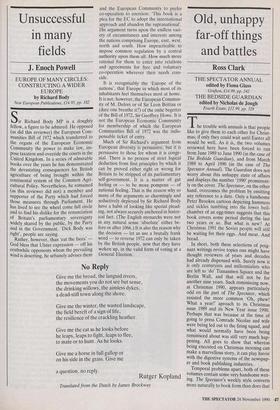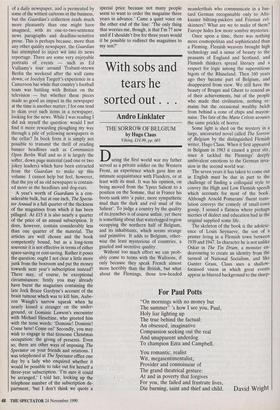Old, unhappy far-off things and battles
Ross Clark
THE SPECTATOR ANNUAL edited by Fiona Glass
Grafton, £14.99, pp. 242
THE BEDSIDE GUARDIAN edited by Nicholas de Jongh
Fourth Estate, £12.99, pp. 328
The trouble with annuals is that people like to give them to each other for Christ- mas; if only they could wait until Easter all would be well. As it is, the two volumes reviewed here have been forced to run from June 1989 to June 1990 (in the case of The Bedside Guardian), and from March 1989 to April 1990 (in the case of The Spectator Annual). The Guardian does not worry about this unhappy state of affairs and displays the number '1990' prominent- ly on the cover. The Spectator, on the other hand, overcomes the problem by omitting any reference to a date. Only a handsome Peter Brookes cartoon depicting hammers and sickles tumbling into the lower bell- chamber of an egg-timer suggests that this book covers some period during the last two years or so. But what is new? At Christmas 1991 the Soviet people will still be waiting for their eggs. And meat. And bread.
In short, both these selections of poig- nant writings revive topics one might have thought reviewers of years and decades had already dispensed with. Surely now it is only centuryists and millennialists who are left to `do' Tiananmen Square and the Berlin Wall, and that will not be for another nine years. Such reminiscing now, at Christmas 1990, appears particularly odd on the part of The Spectator, which resisted the more common 'Oh, phew! What a year!' aproach to its Christmas issue 1989 and its New Year issue 1990. Perhaps that was because at the time of going to press Comrade Nicolae and wife were being led out to the firing squad, and what would normally have been being reminisced about was still very much hap- pening. All goes to show that whereas being executed on Christmas morning can make a marvellous story, it can play havoc with the digestive systems of the newspap- er and book publishing industries. Temporal problems apart, both of these volumes contain some very handsome writ- ing. The Spectator's weekly style converts more naturally to book form than does that of a daily newspaper, and is permeated by some of the wittiest cartoons in the business, but the Guardian's collection reads much more pleasantly than one might have imagined, with its one-to-two-sentence news paragraphs and deadline-sensitive prose. This is perhaps because, more than any other quality newspaper, the Guardian has attempted to inject wit into its news reportage. There are some very enjoyable portraits of events — such as Ed Vulliamy's tour around Trabant-strewn Berlin the weekend after the wall came down, or Jocelyn Targett's experience in a Cameroon bar while that country's football team was battling with Britain on the television — but whether these pieces made so good an impact in the newspaper at the time is another matter; 1 for one tend to skim over such items in a newspaper, looking for the news. While I was reading I did ask myself the question: would I not find it more rewarding ploughing my way through a pile of yellowing newspapers in the cellar? In book form it is simply not possible to transmit the thrill of reading banner headlines such as Communists Open Berlin Wall and so it is largely the softer, down page material (and one or two jokey leaders) which have been extracted from the Guardian to make up this volume. I cannot help but feel, however, that the joy of an old newspaper is contain- ed more in the headlines and dog-ears.
A year's worth of Guardians is a con- siderable bulk, but at one inch, The Specta- tor Annual is a full quarter of the thickness of the magazines from which it has been pillaged. At f15 it is also nearly a quarter of the price of an annual subscription. It does, however, contain considerably less than one quarter of the material. The articles are well chosen and the book competently bound, but as a long-term souvenir it is not effective in terms of either space-saving or cost-saving. Rather it poses the question: ought I not clear a little more junk from the boxroom and put the money towards next year's subscription instead? There may, of course, be exceptional circumstances: firstly you may already have burnt the magazines containing the late Jock Bruce Gardyne's account of the brain tumour which was to kill him, Aube- ron Waugh's narrow squeak when he nearly kissed a stranger on the under- ground, or Dominic Lawson's encounter with Michael Heseltine, who greeted him with the terse words: 'Dominic! Dominic! Come here! Come on!' Secondly, you may wish to engage in that tiresome Christmas occupation: the giving of presents. Even so, there are other ways of imposing The Spectator on your friends and relations. I was telephoned at The Spectator office one day by a lady who enquired whether it would be possible to take out for herself a three-year subscription. 'I'm sure it could be arranged,' I told her, looking up the telephone number of the subscription de- partment, 'but I don't think we quote a special price because not many people seem to want to order the magazine three years in advance.' Came a quiet voice on the other end of the line: 'The only thing that worries me, though, is that I'm 77 now and if I shouldn't live for three years would it be possible to redirect the magazines to my son?'



































































 Previous page
Previous page